Dogs don’t necessarily have a “cold and flu season” like people do, but that doesn’t mean they are immune to getting respiratory infections. Thankfully, often dogs just get mild upper respiratory infections. However, occasionally they can get a more serious respiratory infection like pneumonia in dogs.
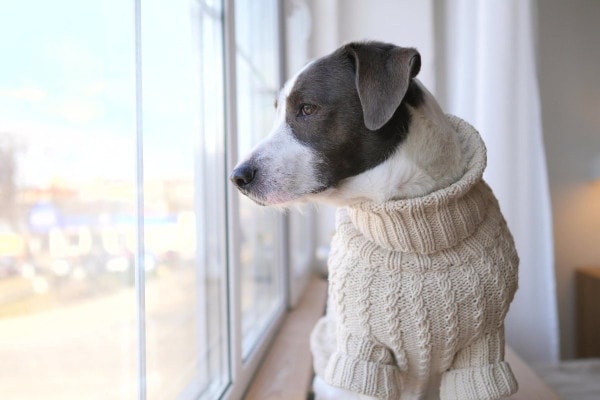
Fast facts on pneumonia in dogs from Dr. Buzby
What is pneumonia in dogs?
The term “pneumonia in dogs” refers to inflammation of the lungs (often due to infection) that leads to the alveoli (i.e. air sacs) in the lungs filling with fluid. This is problematic for your dog because when fluid fills the alveoli, they can’t function properly.
Normally, the alveoli have very thin walls and are right next to tiny blood vessels. When the dog inhales, air fills the alveoli. Then the oxygen from the air diffuses into the bloodstream and the carbon dioxide that was in the bloodstream diffuses into the air in the alveoli. When the process is complete, the blood has been “refilled” with oxygen so it can carry oxygen to the tissues. And the dog can exhale the carbon dioxide to get it out of the body.
However, in pneumonia, the inflammatory process causes changes in the walls of the alveoli, blood vessels, and surrounding tissue. This leads to fluid accumulation in the alveoli, which compromises gas exchange (i.e. trading carbon dioxide for oxygen).
It’s no surprise then that dogs with pneumonia can have difficulty breathing, as well as showing other symptoms.
What are the symptoms of pneumonia in dogs?
Commonly, dogs show some of the following signs of pneumonia:
- Being a lethargic dog or difficulty exercising—Not getting enough oxygen can make your dog sluggish, tired, and unable or unwilling to do normal daily tasks (e.g. take a walk or play).
- Loss of appetite
- Rapid or irregular breathing—You may notice your dog breathing fast or changing the way he or she breathes
- Difficulty breathing—If your dog is gasping, having trouble breathing, or his or her mucous membranes (e.g. gums) are bluish, immediately bring your dog in for an emergency vet visit.
- Coughing (may be moist and productive)—This is the body’s attempt to forcibly move fluid and mucus out of the airways.
- Runny nose—Nasal discharge is typically thick and yellow or green in color.
- Fever—May or may not occur depending on the type and severity of the pneumonia.
- Weight loss—Especially if the pneumonia has been present for a while.
- Dehydration
- Stumbling or being weak or disoriented
- Nasal whistling or wheezing—Your dog might make abnormal sounds when breathing.
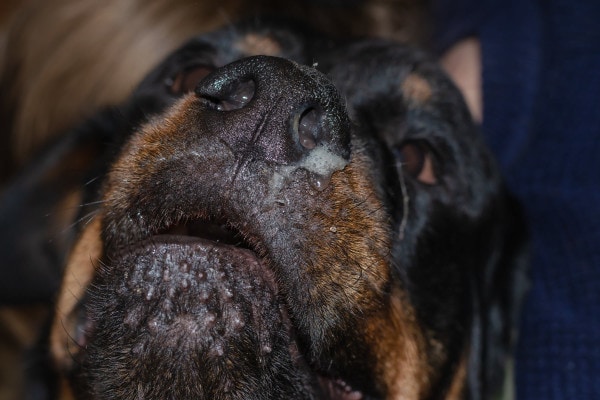
Make an appointment with your vet or go to the ER
If you are seeing these symptoms, it is important to promptly schedule a vet visit for your dog. As noted, if your dog is having trouble breathing or seems very sick, please take him or her to the emergency vet (or to your vet for an emergency appointment) immediately.
At the veterinary appointment, the vet will collect a detailed history about your dog, including any recent trips, boarding or grooming, contact with sick dogs, trauma, or sedation or anesthesia. Plus, he or she may ask about your dog’s current health (e.g. any recent vomiting), past medical history, or ongoing medical problems. All of this information can help the vet narrow down how your dog may have gotten pneumonia.
How do dogs get pneumonia?
There are three main types of pneumonia in dogs—aspiration pneumonia, infectious pneumonia, and inhalation pneumonia. Dogs contract each type in a different way.
Aspiration pneumonia in dogs
Aspiration pneumonia occurs when solid or liquid foreign materials accidentally enter a dog’s respiratory tract. This material can be anything from stomach contents (e.g. food and bile) to water. Additionally, dogs can aspirate certain chemicals or liquid medications.
In the initial stages of aspiration pneumonia, the foreign material damages the lungs (especially if it is something acidic like stomach contents). The inflammation and resulting changes to the lung tissue can lower the lung’s normal defense mechanisms. This allows secondary infections to take hold. Often the infection is from bacteria that were introduced into the lungs from the GI tract or oropharyngeal region (i.e. back of the throat) during aspiration.
Risk factors for aspiration pneumonia
Dogs are at a higher risk of aspiration pneumonia when they are vomiting or when they are recovering from general anesthesia and sedation. Plus, certain neuromuscular disorders (e.g. myasthenia gravis in dogs), esophageal diseases (e.g. megaesophagus in dogs), or laryngeal conditions (e.g. laryngeal paralysis in dogs) can also increase the risk of aspiration pneumonia. And so can force-feeding your dog any medications or foods.
Overall, brachycephalic breeds like Pugs and French Bulldogs are at a higher risk of aspiration pneumonia compared to other dog breeds. Additionally, dog breeds that are prone to laryngeal disease and neuromuscular disorders are also predisposed to developing aspiration pneumonia. Those breeds include:
- Cocker Spaniels
- English Springer Spaniels
- Irish Wolfhounds
- Golden Retrievers
- Labrador Retrievers
- Great Dane
- German Shepherd Dog
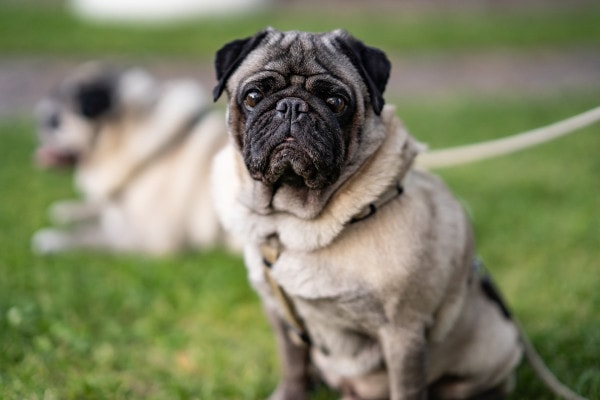
Infectious pneumonia in dogs
Infectious pneumonia occurs when an organism invades the lungs via the airways (i.e. bronchopneumonia), bloodstream (i.e. hematogenous pneumonia), or from another tissue in the chest.
Interestingly, these infectious agents may sometimes come from the dog’s own body rather than being true foreign invaders. In a healthy dog, the host defenses keep the bacteria in a dog’s body (i.e. normal flora) from causing pneumonia. However, very young dogs, older dogs, and those dogs who have cancer, metabolic disorders, or compromised immune systems can sometimes be susceptible to bacterial pneumonia caused by organisms normally found in their body.
Alternatively, dogs can become infected with organisms that come from outside the body. Some other infectious types of pneumonia in dogs include:
- Viral pneumonia—from canine influenza, parainfluenza, or canine distemper virus
- Bacterial pneumonia—from Bordetella bronchiseptica (“kennel cough”) and Mycoplasma spp.
- Fungal pneumonia—from Blastomyces dermatitidis, Coccidioides immitis, and Cryptococcus spp.
- Parasitic pneumonia—from Dirofilaria immitis (i.e. the agent that causes heartworm disease in dogs)
- Protozoal pneumonia—from Neospora and Toxoplasma spp.
Overall, bacterial and viral pneumonias occur much more frequently than the other types. In some cases, two or three of the agents on this list, not just one, may infect a dog simultaneously. And it is also possible for a dog to have infectious pneumonia from an agent that is not on this list.
Is pneumonia contagious?
With the exception of bacterial pneumonia that comes from normal flora, most cases of viral and bacterial pneumonia in dogs start when a healthy dog makes contact with an infected dog or an area where an infected dog was recently.
Some infectious agents are so small that they can travel in water droplets on air currents. (Think about how respiratory droplets can transmit respiratory diseases like COVID-19 in humans.) Other agents may exist on inanimate objects for a certain period of time. And dogs may pick up some fungal agents from the soil.
(Note: While it won’t help prevent all types of pneumonia, having at-risk dogs vaccinated against parainfluenza, distemper, kennel cough, and influenza can be a great idea.)
Thankfully, it is extremely rare for humans to get pneumonia from dogs. And there are very few reports of dogs getting pneumonia from their humans.
Inhalation pneumonia
Inhalational pneumonia can occur when a dog inhales harmful particulates such as smoke or harsh chemicals. When present in the alveoli, these particles may inhibit the ability of the immune system to naturally fight off infection. As a result of the damaged defense mechanisms in the lungs, the dog is prone to secondary bacterial pneumonia.
Other types of pneumonia
While not one of the main types of pneumonia, young dogs can get a condition called eosinophilic pneumonia. It is thought to be an autoimmune disorder that causes pneumonia due to a variety of triggers.
How does the vet diagnosis a dog with pneumonia?
In addition to collecting a good history to get an idea of whether one of these types of pneumonia might be the culprit, the vet will also perform a comprehensive physical exam. With pneumonia, the veterinarian may hear harsh lung sounds when listening to the chest. Or sometimes hearing lung sounds that are quieter than usual can indicate that fluid is present in the lungs.
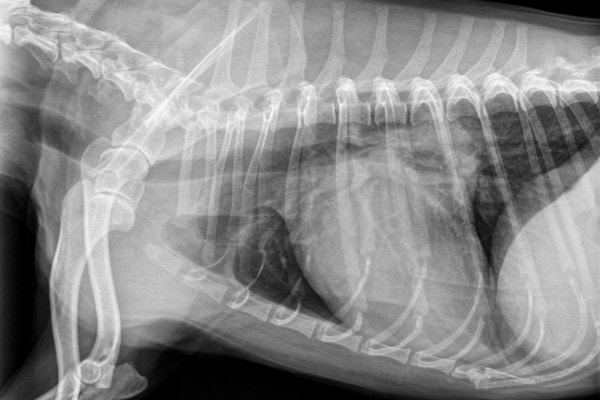
Diagnostic testing
If the vet hears abnormal lung sounds, he or she will most likely recommend taking a chest X-ray. This is one of the most important tests because it allows the vet to identify characteristic patterns of fluid in the lungs that point to pneumonia. And it can also help rule out some of the other causes of coughing and difficulty breathing in dogs.
The vet may also recommend blood tests for dogs such as a complete blood count (CBC). Elevated numbers of white blood cells on the CBC may indicate infection or inflammation in the body.
Especially in more complex or severe cases, or if the dog is not responding to antibiotics, the vet may suggest performing some specialized testing. Sometimes the vet can do this in-house. But in other situations, he or she may refer you to a veterinary specialist near you.
One such test is a bronchoalveolar lavage (BAL), which allows the vet to collect a sample of material from the lungs for culture. At the same time, the vet can perform a bronchoscopy (i.e. scoping the airways) to get a better idea of what is happening in the airways and look for foreign material.
Since some of these specialized tests can take time to yield results, your veterinarian will typically recommend starting treatments right away, not waiting for results. Once he or she has the results, the vet can modify the plan accordingly.
What is the treatment for pneumonia in dogs?
The treatment for pneumonia depends in large part on the underlying cause and the severity of the pneumonia. For example, antibiotics may be effective for infectious bacterial pneumonia (or aspiration pneumonia since it is usually bacterial). But treating fungal pneumonia would require antifungal drugs. This is why reaching an accurate diagnosis through testing and a detailed medical history is so important.
Treatment for mild pneumonia
It may be possible to treat dogs who have mild symptoms on an outpatient basis. This typically involves oral antibiotics and possibly an anti-inflammatory (e.g. carprofen for dogs). Most dogs with mild bacterial pneumonia will need antibiotics for at least one to two weeks.
Treatment for moderate to severe pneumonia
However, dogs with moderate to severe cases of pneumonia may require hospitalization for a combination of supplemental oxygen, intravenous antibiotics, and fluid therapy. In complicated cases, the dog may even need two different antibiotics at once. Some of these antibiotics are not available (or effective) in an oral form, so they must be given intravenously.
Some dogs can be stabilized and sent home on oral antibiotics. But others may require a week or more of hospitalization and critical care.
How can I help my dog with pneumonia at home?
Nebulization treatments can also be helpful for dogs with pneumonia. Breathing in vaporized saline can loosen the mucus stuck in the lower airways.
If a nebulizer isn’t available, some vets recommend having pets breathe in hot steam from a shower for 10 to 15 minutes. This can be a great way to help a dog with pneumonia at home. However, please do NOT put your furry friend directly into the shower!
Coupage is another useful tool. It is typically performed right after nebulization or steam shower therapy. To perform coupage, use a cupped hand to pat each side of a dog’s chest for three to five minutes. This motion helps loosen the mucus.
Finally, since dogs with pneumonia don’t always feel like eating, you may want to try handfeeding them, warming up some canned food to make it smell good, moistening their dry food with water, or adding some tempting morsels (e.g. treats, cottage cheese, or canned pumpkin for dogs) to their food. If this doesn’t work, you can also talk to your vet about appetite stimulants for dogs.
Keep in mind though that all of these ideas are things you can do at home in addition to the veterinarian-prescribed treatments, not instead of going to the vet.
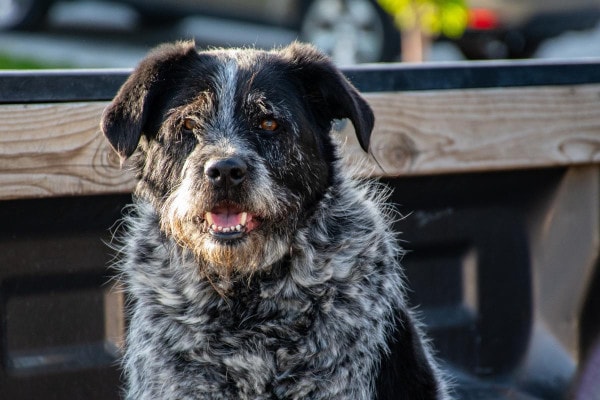
What is the prognosis for pneumonia in dogs?
Thankfully, dogs with mild cases of pneumonia who are treated on an outpatient basis tend to have a very good prognosis and recover quickly. Dogs with moderate to severe cases can also have a good prognosis, but only with aggressive therapy.
To put some numbers with those statements, one study of 125 dogs with aspiration pneumonia showed an overall survival rate of 81.6%. This number is similar to those found in other studies of dogs with bacterial pneumonia (survival rates of 77%-94%).
Work with your veterinarian
Pneumonia can sound scary, but thankfully data (and personal experience) show that most dogs do make a full recovery. If you are faced with a dog with pneumonia, the best thing you can do is work closely with your veterinarian. Follow his or her instructions carefully. And be sure to let your vet know if your dog isn’t recovering as expected or you have any questions. Hopefully, all of this will be behind you and your pup in no time so you can keep on enjoying life to the fullest!
Has your dog every had pneumonia?
Please share his or her story below.


My newly adopted coonhound was in breathing coughing distress during the night so I got her to the vet early morning. I could tell he was concerned. He sedated her and took x-rays. .Sure enough she had pneumonia. I had taken a video of her coughing breathing for the vet.which led hi m to examine her throat to discover she had laryngeal paralysis. I had never heard of this and had to take a deep dive into a disease that can be devastating. She is doing better and I am giving her doxipine which is helping some. She is approximately 8 or 9 so I am looking at the possibility of tie back surgery. When I look back on her symptoms. the back leg weakness , the throat clearing etc. it seems clear she had lar -par. but I was told she had arthritis. .We love her dearly and so does our crew. I am devastated her life span could be short.. I will keep doing research on this disease.
Hi Carol,
I am so sorry your girl is facing this uncertain future. I understand your concern and think it is good you are searching for advice. I will attach links to other articles about Lar Par. Hoping you can find the information you are looking for and can make a decision that is best for you and your pup. Praying for a positive outcome!
1. Laryngeal Paralysis in Dogs: The Ultimate Guide
2. Tie Back Surgery for Dogs with Laryngeal Paralysis
3. Doxepin & Non-Surgical Management of Canine Laryngeal Paralysis